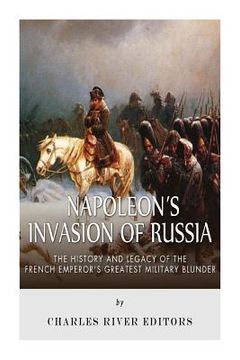Napoleon's Invasion of Russia: The History and Legacy of the French Emperor's Greatest Military Blunder (en Inglés)
Reseña del libro "Napoleon's Invasion of Russia: The History and Legacy of the French Emperor's Greatest Military Blunder (en Inglés)"
*Includes pictures *Includes accounts of the campaign written by French soldiers *Includes a bibliography for further reading *Includes a table of contents "The thunderstorms of the 24th turned into other downpours, turning the tracks--some diarists claim there were no roads in Lithuania--into bottomless mires. Wagon sank up to their hubs; horses dropped from exhaustion; men lost their boots. Stalled wagons became obstacles that forced men around them and stopped supply wagons and artillery columns. Then came the sun which would bake the deep ruts into canyons of concrete, where horses would break their legs and wagons their wheels." - Richard K. Riehn French emperor Napoleon Bonaparte was not a man made for peacetime. By 1812, he had succeeded in subduing most of his enemies - though in Spain, the British continued to be a perpetual thorn in his flank that drained the Empire of money and troops - but his relationship with Russia, never more than one of mutual suspicion at best, had now grown downright hostile. At the heart of it, aside from the obvious mistrust that two huge superpowers intent on dividing up Europe felt for one another, was Napoleon's Continental blockade. Russia had initially agreed to uphold the blockade in the Treaty of Tilsit, but they had since taken to ignoring it altogether. Napoleon wanted an excuse to teach Russia a lesson, and in early 1812 his spies gave him just that: a preliminary plan for the invasion and annexation of Poland, then under French control. Napoleon wasted no time attempting to defuse the situation. He increased his Grande Armee to 450,000 fighting men and prepared it for invasion. On July 23rd, 1812, he launched his army across the border, despite the protestations of many of his Marshals. The Russian Campaign had begun, and it would turn out to be Napoleon's biggest blunder. Russia's great strategic depth already had a habit of swallowing armies, a fact many would-be conquerors learned the hard way. Napoleon, exceptional though he was in so many regards, proved that even military genius can do little in the face of the Russian winter and the resilience of its people. From a purely military standpoint, much of the campaign seemed to be going in Napoleon's favor since he met with little opposition as he pushed forwards into the interior with his customary lightning speed, but gradually this lack of engagements became a hindrance more than a help; Napoleon needed to bring the Russians to battle if he was to defeat them. Moreover, the deeper Napoleon got his army sucked into Russia, the more vulnerable their lines of supply, now stretched almost to breaking point, became. The Grande Armee required a prodigious amount of material in order to keep from breaking down, but the army's pace risked outstripping its baggage train, which was constantly being raided by Cossack marauders. Moreover, Napoleon's customary practice of subsisting partially off the land was proving to be ineffective: the Russians were putting everything along his line of advance, including whole cities, to the torch rather than offer him even a stick of kindling or sack of flour for his army. Napoleon was sure that taking Moscow would prompt the Russians to surrender. Instead, with winter on the way, the Russians appeared more bellicose than ever. Napoleon and his army lingered for several weeks in the burnt shell of Moscow but then, bereft of supplies and facing the very real threat of utter annihilation, Napoleon gave the order to retreat. By the time the Grande Armee had reached the Berezina, it had been decimated: of the over 450,000 fighting men that had invaded Russia that autumn, less than 40,000 remained. Napoleon's Invasion of Russia details the background leading up to the campaign, the fighting, and the aftermath of France's catastrophic defeat. Along with pictures of important people, places, and events, you will learn about the French invasion of Russia like never before.

